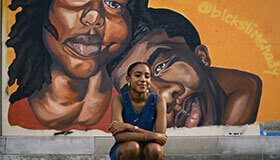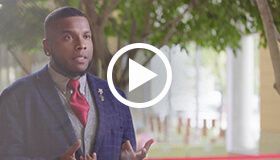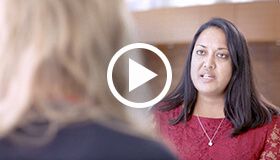On April 28, four BIPOC (Black, Indigenous, and People of Color) alumni business owners gathered for a virtual panel discussion about the unique challenges and successes they experienced when starting their businesses. Alexis Avila MS’02; Lisa Harris ’97; Reena Vokoun ’98; and Ja’Mel Ashely Ware ’06 opened up to viewers in this candid conversation moderated by Beny Pérez-Reyes ’09.
The discussion featured questions concerning the first steps that panelists took to act on their business ideas, challenges they faced as they started their businesses, and how their identities influence their work. Although each person’s experiences were different, several key themes emerged, such as the importance of staying focused on who their target audience is, understanding that they can’t do everything alone, and getting help from the right places. Furthermore, Pérez-Reyes noted: “From all four of our panelists, we see that each of them started their business idea by really addressing a need that they felt was organic to who they were.”
At one point, an audience question about obtaining venture capital or private equity funding was met with silence from the panelists — so Pérez-Reyes, a financial consultant who specializes in this area, jumped in. “I think one of the biggest barriers for People of Color when we’re talking about funding is understanding what funders want from business owners.” He explained exactly what potential investors look for and how to convey that information in a quick, easy-to-digest format that increases the chances of gaining financial support. “I think that’s something that many People of Color — because we don’t come from backgrounds where that is necessarily something that is spoken about — it becomes difficult to obtain capital,” he said.
One of the most moving questions concerned identity. “How does your identity affect or influence your work?” Pérez-Reyes asked the group.
Avila shared, “As a Puerto Rican business owner, I always felt like I was a little different from everybody else around me — and I am. … I didn’t feel like I fit in. I didn’t feel like maybe I deserved to be where I was.” He spoke of self-esteem struggles and how he’s had to work harder to excel in areas where others seemed to succeed easily. But he also feels that this has made him more open minded than many of his competitors — and today, his business is known for its personalized approach to clients’ needs. He added: “Being a minority, a person of color, in business in a predominantly white profession is much needed, and our voices are needed. So, I’m very proud of it today, to be a Puerto Rican business owner.”
Harris reflected: “When I show up in my business and as a leader, this is who people see, right? They do see the color of my skin. So, owning my identity and ensuring that I speak up for myself and all those who are underrepresented in our community is super important to me. … When I’m able to own my identity, I show up as my most authentic self.” She added that “being multiracial is also a unique perspective. I have a foot in so many different worlds, all the time. And it just has really allowed me to build bridges between drastically different individuals, drastically different communities. And this has really become one of my greatest talents and really the cornerstone to the success I’ve been having.”
Vokoun spoke of being the child of immigrant parents and how her upbringing came to define her brand. “When I look at the clients that I work with, it is … celebrating the fact that they’re unique and different — which, for me, was not always easy to do, personally. I have years of growing up wanting to fit in and wanting to be like everybody else and wanting to hide my Indian heritage. But now, as an adult and as a mother, I have realized how important it is to celebrate that. … My mom always used to say, ‘No matter where you go or what you do, nobody will ever let you forget where you came from. So don’t you forget it.’ I say that to my kids now.”
Likewise, Ware spoke passionately about the importance of being one’s whole self. “I do not like this ideal of putting on one mask and removing it when you go in and out of different spaces,” he said. “My brand embodies what it means to live in the intersection of race, in the intersection of economics, in the intersection of queerness, and on and on. It’s all about creating a space and providing resource to people that often time have to assimilate to the status quo and do not feel like they have — like we have space to exist and to be and belong. My entire identity is woven throughout the thread of what it means to me to be an entrepreneur.”






